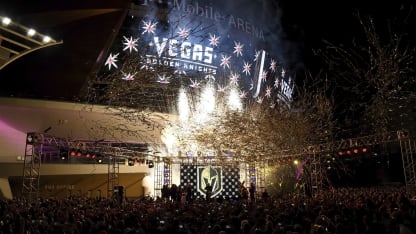For the first time since the Wild and Columbus Blue Jackets volleyed selections in 2000, the NHL will welcome a new franchise to the fold via an Expansion Draft, which will be conducted in conjunction with the NHL Awards here on Wednesday.
While some of the rules surrounding the draft itself will be similar this time around, there will be some major differences.
NHL Expansion Draft: Expect the Unexpected
Golden Knights set to select bulk of first roster Wednesday in Las Vegas

By
Dan Myers
Wild.com
For one, this will be the first Expansion Draft conducted in the salary cap era. Because there is only one team selecting players this time around, it gives the Vegas Golden Knights, led by general manager George McPhee, tremendous leverage to build: A) a strong team that could compete immediately, or B) an opportunity to stockpile a large quantity of assets to build for the future. Of course, the Golden Knights' path will likely fall somewhere in the middle.
Before diving into how the draft could affect the Wild, here are some basic ground rules regarding the draft itself, via NHL.com:
• The Las Vegas franchise must select one player from each presently existing club for a total of 30 players (not including additional players who may be acquired as the result of violations of the Expansion Draft rules).
• The Las Vegas franchise must select the following number of players at each position: 14 forwards, nine defensemen and three goaltenders.
• The Las Vegas franchise must select a minimum of 20 players who are under contract for the 2017-18 season.
• The Las Vegas franchise must select players with an aggregate Expansion Draft value that is between 60-100 percent of the prior season's upper limit for the salary cap ($73 million).
• The Las Vegas franchise may not buy out any of the players selected in the Expansion Draft earlier than the summer following its first season.
Here are the rules for each of the remaining 30 teams regarding players they were required to make available:
• Clubs will have two options for players they wish to protect in the Expansion Draft:
a) Seven forwards, three defensemen and one goaltender
b) Eight skaters (forwards or defensemen) and one goaltender
• All players who have currently effective and continuing "No Movement" clauses at the time of the Expansion Draft (and who to decline to waive such clauses) must be protected (and will be counted toward their club's applicable protection limits).
• All first- and second-year professionals, as well as all unsigned draft choices, will be exempt from selection (and will not be counted toward their club's applicable protection limits).
What does this mean for Minnesota?
Based on the structure of its roster, the Wild has chosen to go with route A, protecting seven forwards, three defensemen and one goaltender.
As indicated above, all players with no movement clauses in their contracts must be protected and will count toward their club's limit.
That means forwards Mikko Koivu, Zach Parise and Jason Pominville and defenseman Ryan Suter had to be protected.
On Sunday, the Wild
announced
its other protectees: Goaltender Devan Dubnyk, defensemen Jonas Brodin and Jared Spurgeon, and forwards Charlie Coyle, Mikael Granlund, Nino Niederreiter and Jason Zucker.
That leaves the club with a bevy of valuable assets left unprotected, including defensemen Matt Dumba and Marco Scandella and forwards Erik Haula and Eric Staal.
First- or second-year pros like Mike Reilly, Alex Tuch, Luke Kunin, Joel Eriksson Ek and Mario Lucia, among others, are not eligible to be selected by Vegas and don't need protection.
For the Golden Knights, it won't be as simple as simply scanning teams' protected lists and selecting accordingly. For the past several weeks and even months, McPhee has been in touch with all 30 teams, essentially putting together a giant puzzle.
While Vegas could simply select one of Minnesota's unprotected players, it's likely Wild Executive Vice President and General Manager Chuck Fletcher has had numerous conversations with McPhee over the past several weeks in an effort to dictate which asset the Wild will lose.
For example: Vegas is interested in both assets A and B, but Fletcher values one of those more than the other. He could offer McPhee another player or a draft pick in order to keep the one the Wild would rather keep.
"It's actually a compliment to our organization that we have so many tough decisions," Fletcher said in a news conference last week. "No matter what we do, we're going to have to expose five or six players that … we certainly have no desire to lose. The good news is we can only lose one player. Sometimes at 3 in the morning when I wake up, I remind myself of that. 'You can only lose one player; go back to sleep.'"
There are other variables.
Teams on the playoff fringes may see a player of interest from a rival team left unprotected, and offer to make it worth Vegas' time to select said player and flip him to them. You can bet Fletcher has scanned other teams' unprotected lists for players that may interest him, as other teams have surely done to the Wild. If there's a deal to be made, Fletcher and McPhee could work it that way.
Some teams are up against the salary cap, which is expected to go up only slightly, if at all, this season. They could be willing to offer up additional assets, whether it be draft picks or prospects, in order for McPhee to take a problematic contract off their hands.
It's up to McPhee to navigate all of these moving parts and do what he feels is in the best interest of the Golden Knights. The remaining 30 GMs across the League are doing the same thing for their own franchises, which leaves little room for certainty.
"[The Golden Knights] have been very forthcoming in what they're trying to accomplish," Fletcher said. "There's ways I think we can come to an arrangement that benefits both parties. But they're trying that with other teams, too."
With coaches and front office personnel around the NHL expecting a frenzied period over the next two weeks between the expansion draft, the entry draft and the start of free agency on July 1, only one thing is certain: expect the unexpected.


















